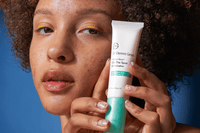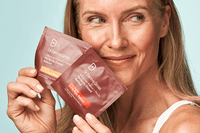Temperature Check: What’s The Right Water Temp To Wash Your Face?
5 minutes

There are varying schools of thought when talking about the optimal temperature of the water you use to wash your face. But if you ask any dermatologist (like our founder, Dennis Gross, MD), there’s only one right answer.
Lukewarm water is the winner
Just like Goldilocks, you’ll find your happy place when you avoid extremes. Lukewarm water is the way to go for any skin-related cleansing (including your body). You want some warmth in your water, since as you probably know, heat can help loosen plugs in pores. (This is the reason steamers are so popular with aestheticians.) Warm skin also absorbs your subsequent skincare products better. But emphasis on warm — water that’s too hot spells trouble, as we’ll get to below.
Ice-cold water isn’t a great option either, although it will cause less skin damage than hot water will. The issue is that super-cold water doesn’t dissolve oil and makeup all that well (even if you’re using a facial cleanser), so your skin won’t end up as clean as you think. Some experts also believe that the vasoconstriction cold water triggers in your skin leads skin to close up around dirt, oil, and bacteria before your cleanser can wash it away.
Is there ever a time to wash your face with cold water?
If you want to splash your face with some cold water after you finish your cleansing routine, that’s totally cool (no pun intended). Since cool temps cause blood vessels to constrict, a cold-water rinse can help bring down irritation-induced inflammation in acneic skin. By the same token, cold water can also help reduce puffiness, whether around the eyes or throughout the complexion in general. That will lead to a “brighter, tighter” appearance overall, albeit a temporary one.
Is there ever a time to wash your face with hot water?
Nope, definitely not. Hot water will cause your skin all kinds of heartaches. For one, hot water strips skin of its natural oils (which you need, no matter what your skin type). This can cause skin to produce more oil (which could trigger breakouts) and also weaken its moisture barrier. Once the moisture barrier is compromised, a host of issues can develop in what was previously balanced skin, like dryness and inflammation.
Hot water also exacerbates existing skin conditions, such as psoriasis, eczema, and rosacea. If you even have the slightest tendency to flush, hot water will bring redness right to the surface.
Top tips for washing your face
Now that you know you need to begin with lukewarm water, here’s more advice for optimizing the first step of your skincare routine.
Cleanser is key
Skin is delicate and should be treated as such, so stick with a gentle cleanser. But gentle doesn’t mean ineffective. Our Dr. Dennis Gross AHA/BHA Daily Cleansing Gel contains alpha and beta hydroxy acids to eliminate dirt and dead skin cells, but won’t disrupt skin’s moisture barrier and is so gentle, you can use it around the eyes.
Make the right moves
Take a hands-on approach and use your fingertips to massage cleanser into your skin in a circular motion. While a cleansing brush may seem convenient, even the most delicate bristles are too harsh for your even more delicate face.
Pick a favorite towel
Bacteria love towels because they’re an ideal breeding ground. There’s nothing you can do about that. You also can’t completely eliminate bacteria from your life. But you can ensure that bacteria from your face doesn’t mix with bacteria from other areas (and vice versa) by designating one towel specifically for your face and keeping it clean.
Learn More About Skincare From Dr. Dennis Gross
For more skincare tips from the experts at Dr. Dennis Gross, check out our blog’s newest content today. Shop the collection of Dr. Dennis Gross bestselling skincare, including our new DermInfusions technology now available.
Written By
Ben Gentzler
Ben Gentzler ha trabajado en la industria de la belleza durante 17 años, 10 de los cuales se dedicaron al cuidado clínico de la piel. Es un esteticista licenciado apasionado por la educación profesional líder en tratamientos de vanguardia en los mejores spas de todo el mundo y por la formación en la ciencia de la piel. Ben se ha capacitado directamente con el Dr. Dennis Gross, aprendiendo sobre lo último en cuidado de la piel y trabajando con sus clientes para ayudarlos a lograr su mejor piel.
Read More from Ben Gentzler
Written By
Ben Gentzler
Ben Gentzler ha trabajado en la industria de la belleza durante 17 años, 10 de los cuales se dedicaron al cuidado clínico de la piel. Es un esteticista licenciado apasionado por la educación profesional líder en tratamientos de vanguardia en los mejores spas de todo el mundo y por la formación en la ciencia de la piel. Ben se ha capacitado directamente con el Dr. Dennis Gross, aprendiendo sobre lo último en cuidado de la piel y trabajando con sus clientes para ayudarlos a lograr su mejor piel.
Read More from Ben GentzlerRelated Articles
-

acne, author-ben-gentzler, skin-and-deeper April 03, 2024 — 6 minutes
Hit It: Introducing The Dr. Dennis Gross Alpha Beta On The Spot Eliminator
by Ben Gentzler
-

author-ben-gentzler, myth-busting, oily-skin, skin-and-deeper April 01, 2024 — 9 minutes
Myth busted: Yes, your oily skin does need a moisturizer
by Ben Gentzler
-

author-ben-gentzler, pro-tips, retinol, skin-and-deeper March 25, 2024 — 5 minutes
How to Use Perfectly Dosed Retinol Pads Like a Pro
by Ben Gentzler
Keep Reading
Mantente al día con los últimos consejos de nuestro equipo de expertos en cuidado de la piel.
Regístrese para recibir un resumen mensual de consejos para el cuidado de la piel, el bienestar y el estilo de vida.






